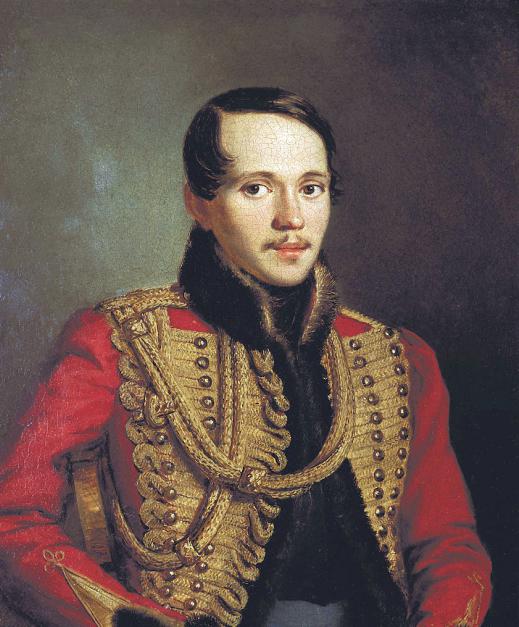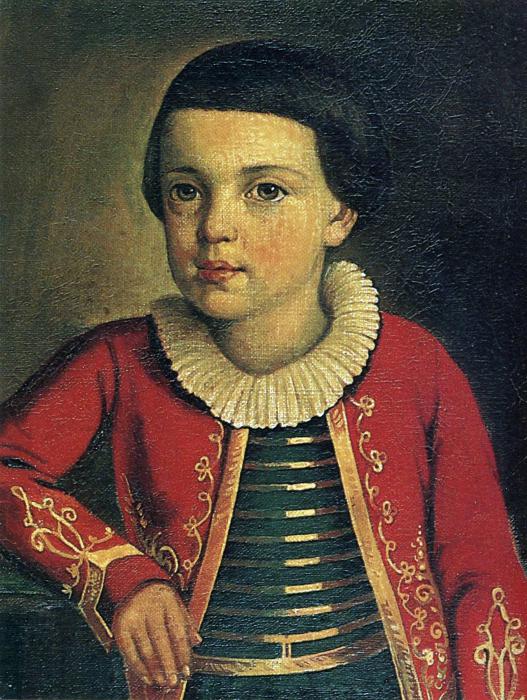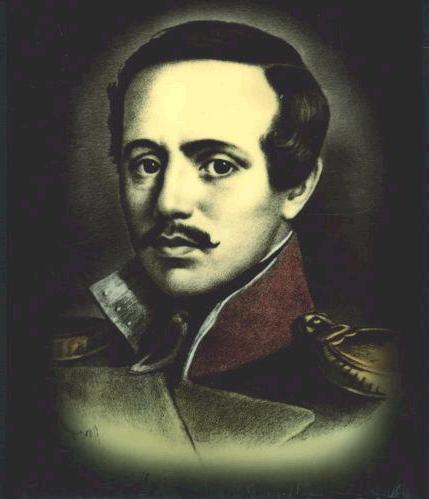Already in the outgoing, 2014, the literary world celebrated the 200th anniversary of the great Russian poet and prose writer - Mikhail Yurievich Lermontov. He is certainly an iconic figure in Russian literature. His rich work, created in a short life, had a significant impact on other famous Russian poets and writers of the 19th and 20th centuries. Here we consider the main motives in the works of Lermontov, as well as talk about the originality of the poet's poetry.
On the origin of the Lermontov clan and the education of the poet
Before we begin to consider the work of Mikhail Yurievich, it is necessary to write a few sentences about where the poet came from in the beginning of the 19th century with such a name unusual for the then Russian ear. So, in all likelihood, the ancestors of Lermontov came from Scotland and originated from Thomas Lermont, the legendary Celtic bard who lived in Scotland in the 13th century. Looking ahead, we’ll point out one interesting detail: the great English poet George Byron, so respected by Lermontov, also considered himself a descendant of Thomas Lermont, due to the fact that one of Byron’s ancestors was married to a woman from the Lermont clan. So, one of the representatives of this family name was taken prisoner at the beginning of the 17th century, enlisted in the army, converted to Orthodoxy and became the ancestor of the Russian surname Lermontov. However, it is worth noting that Mikhail Yuryevich himself at first associated his surname with Francisco Gomez Lerma, a 16th-century Spanish statesman. This is reflected in Lermontov’s drama The Spaniards. But the poet devoted lines from the poem "Desire" to his Scottish roots. Lermontov’s childhood passed in the estate of Tarkhany of the Penza province. The poet was brought up mainly by his grandmother, Elizabeth Alekseevna Arsenyeva, who loved her grandson madly. Little Misha was not in good health and suffered from scrofula. Due to his poor health and this illness, Misha could not spend his childhood like he was spent by many of his peers, and therefore his own imagination became the main “toy” for him. But none of those around and relatives even noticed either the poet’s internal state, or his dreams and wanderings about “his own, other worlds”. It was then that Misha felt the very loneliness, gloom and, on the part of other people, the misunderstanding that would accompany him throughout the rest of his life.

Lermontov's literary heritage
Lermontov’s creative career, like his life, was very short, but extremely productive. All his conscious literary activity - from the very first student’s pen tests to writing the pinnacle of his prose, the novel “Hero of Our Time” - lasted a little over twelve years. And during this time, the poet Lermontov managed to write more than four hundred poems, about thirty poems and six dramas, and the prose writer Lermontov also wrote three more novels. Researchers decided to subdivide all the writer's work into two periods: early and mature. The boundary between these periods is usually the second half of 1835 and the first half of 1836. But we will keep in mind that throughout his career, Lermontov remained faithful to his ideas, literary and life principles, which were formed at the very initial stage of his formation as a poet, as a person. The decisive role in the creative development of Mikhail Yurievich was played by two great poets: Pushkin and Byron. The attraction to romantic individualism, to the depiction of the deepest spiritual passions, to lyrical expression, to the type of a hero who is in conflict with other people, and sometimes the whole society, which is characteristic of Byron’s poems, is especially pronounced in the poet’s early lyrics. But the poet Lermontov still overcomes Byron’s influence on his work, which he writes in his verse “No, I’m not Byron, I’m different ...”, while Pushkin was and remained for him the same literary reference point throughout of life. And if initially Lermontov directly imitated Pushkin, then already in the mature period of his work he gradually began to develop Pushkin's ideas and traditions, sometimes as if entering into some kind of creative polemic with him. In his late work, Lermontov, we see, was completely disappointed in life, he already ceases to portray his inner world as something exceptional, but on the contrary, begins to move on to ordinary feelings. However, he never managed to resolve his eternal question, which tormented his soul from his youth. Or did not have time.

Lyrics of Lermontov
Lermontov’s work is impossible to imagine without his lyrics. We all read his poems. Lyrics M.Yu. Lermontova is largely autobiographical: she relies on the sincere emotional experiences of the poet, due to the events of her personal life and torment. However, it is worth noting that this autobiography is not just from the real life of the poet, but the most literary, that is, creatively transformed and interpreted by Lermontov himself through the prism of his perception of the world and himself. The subject of Mikhail Yurievich's poems is unusually broad. The main motives of Lermontov’s lyrics are philosophical, patriotic, love, religious. He wrote about friendship, about nature, about the search for the meaning of life. And when you read these verses, then an amazing feeling involuntarily arises - a bright feeling of the deepest sorrow and sadness ... But how bright it is - this feeling! And now we will dwell on these motives in more detail and show what the originality of Lermontov’s lyrics is all the same.

Loneliness and the search for the meaning of life
Lermontov’s lyrics, his poems , especially early ones, are almost all permeated with an experience of sad loneliness. Already the first poems display a mood of denial and despondency. Although these moods, where the poet himself is visible in the person of the lyrical hero, are already quickly changing to an open monologue, it speaks of people who do not care about the talent and inner world of the human soul. In the Monologue, Lermontov is no longer talking about man, but about people, that is, in fact, the personal "I" is inferior to the wider "we". This is how the image of an empty generation spoiled by this world takes shape. The image of the "cup of life" is very common for the "early" Lermontov; he reaches its climax in the eponymous poem "Cup of Life". And it was not for nothing that the poet himself spoke of himself as an eternally suffering person. The image of the eternal wanderers gives a clue and a clue to the whole poem "Clouds", since the fate of the clouds described by the poet becomes closer to the fate of the poet himself. Like Lermontov himself, the clouds have to leave their native land. But the trick is that nobody drives these clouds, they become wanderers of their own free will. This contrast of two worldviews, that is, freedom that frees a person from his attachments, from love, from other people, is denied. Yes, I am free in suffering and persecution, and my choice, but I am not free because I suffer, because I have not forgotten my own ideals, principles, and Homeland.

Political motives in the works of Lermontov
The lyrics of Lermontov, poetry is a testament of the poet to his descendants. And he bequeathed to serve the best human ideals, translating them into eternal works of art. Many of Lermontov’s poems entered the hearts of compatriots precisely on the days of Russian national mourning, for example, on the days of the death of the genius Pushkin, when the country mourned, having lost its best poet. The author of the poem “To the Death of a Poet” shocked Pushkin’s friends and confused his enemies, thereby causing hatred among the latter. The enemies of Pushkin, a poetic genius, became the enemies of Lermontov. And such a struggle of Russian poetry with its enemies, stranglers and oppressors of their beloved Motherland continued already by the efforts of Lermontov. And no matter how difficult this struggle may be, victory still remained with Russian literature - one of the greatest world literature. Before Lermontov, there was practically no case that the poet just “threw” verses so strong and frank in the face of the government that they instantly caused a certain resonance in society: excitement and anxiety. Such was Lermontov’s poem “On the Death of a Poet” and several others. This poem sounded not only the voice of anger and sorrow, but above all - retribution. It reflects the tragedy of an advanced thinking person in Russia in the first half of the 19th century.
Theme of love in the lyrics of Lermontov
The originality of the lyrics of Lermontov is emphasized in his poems about love. In Lermontov’s love lyrics, sadness almost always sounds, permeating the entire verse. In the early period of the poet’s work, we can hardly find bright, joyful emotions in his love lyrics. And this distinguishes him from Pushkin. In Lermontov’s poems of an early period, it is primarily about unrequited love, about female betrayals, when a woman cannot appreciate the lofty feelings of the poet, her friend. However, in poetry Lermontov often finds the strength, on the basis of his own moral principles, to abandon personal happiness and claims for the sake of a beloved woman. The female images depicted in verse by Lermontov are serious and charming. Even in the smallest love poem, the poet invested all his heartiness, all his feelings for his beloved. These are poems that, no doubt, were born and were caused solely by love. An objective love, Christian, “right”, not selfish, in spite of the strongest annoyance expressed in sharp rhyming lines. However, Lermontov was not a melancholic, he was a tragic poet ... Although he was extremely demanding on people and life, looking at everything from the height of an indisputable ingenious talent. But every year the poet’s faith in friendship and love only grew stronger. He searched and even found what he could call a "soul mate." In the poet’s late poetry, one can more and more rarely encounter the theme of unrequited, lonely love; Mikhail Yuryevich increasingly begins to write about the possibility and necessity of mutual understanding between people close in spirit; increasingly, he writes about devotion and loyalty. Love lyrics M.Yu. Lermontov in recent years is almost free from hopeless spiritual anguish that he often tormented the poet before. He has become different. To love and be friends, as the “late” Lermontov believed, means to wish good to your neighbor, to forgive all petty insults.

The philosophical poems of the poet
Philosophical motifs in the lyrics of Lermontov, as well as all of his work, in perception and emotions, are mostly tragic. But this is by no means the fault of the poet himself, but he just saw the world around him, his life, filled with injustice and suffering. He is constantly looking, but almost always does not find harmony and a way out for his passions in life. The rebellious and ardent heart of the poet is constantly striving for freedom from this "prison" of his life. In our unjust world, according to Lermontian philosophical lyrics, only evil, indifference, inaction, and adaptability can get along. All these topics of Lermontov's concern especially in the already mentioned poem "Monologue". There we see his heavy, bitter thoughts about his own destiny, his fate, about the meaning of life, about the soul. The philosophical motives in Lermontov’s lyrics are subordinate to the idea that the poet in this world does not find true freedom, sincerity of feelings, genuine storms and excitements in the souls and hearts of other people, so needed by his soul, but instead of those storms finds indifference. Lermontov, talking about his own life, in which indelible eternal longing prevails, seeks to become like a blue wave, noisily rolling its waters, or a white sail, rushing into the distance in search of storms and passions. But he does not find this either in his native land or in foreign lands. Mikhail Yurievich ironically recognizes all the tragic transience of earthly life. A man lives and seeks happiness, but dies without finding him on earth. But in some verses we see that Lermontov does not believe in happiness after death, in the afterlife, in which, as an Orthodox Christian, he undoubtedly believed. Therefore, in many of his philosophical poems, we can easily find skeptical lines. For Lermontov, life is a constant struggle, a continuous opposition of two principles, the desire for good and light, for God. The literary quintessence of his concept of the world and man becomes one of the most famous poems - “Sail”.

Prayer as a special genre in Lermontov’s poems
Consider another layer of poetry. The theme of prayer in the lyrics of Lermontov plays a significant, if not more, role. Let's consider in more detail. Prayer in the lyrics of Lermontov, perhaps, can even identify a special peculiar "genre". Mikhail Yuryevich, brought up in Orthodoxy, has several poems, which are called "Prayer". The poem "Gratitude" is similar to them on the subject. However, the attitude of the poet towards God is contradictory. Prayer as a genre in the lyrics of Lermontov is constantly evolving. From 1829 to 1832, Lermontov’s “prayers” were built, it can be said, according to a certain principle familiar to all, and the lyrical “I” really appeals to God and asks for His protection and help, treating faith with hope and also sympathy. But if we take a later period, then we can observe in the poet’s prayer verses a certain opposition to the will of the Almighty, reinforced by irony, insolence and sometimes requests for death. By the way, it can be seen partially in the early verses, at least in "Do not blame me, Almighty ...". Such a turn in the lyrics can be associated with Lermontov’s turbulent and rebellious character, differences in his behavior and mood, which both the poet’s acquaintances and biographers are talking about. Perhaps no one else - neither before nor after Lermontov - if we study Russian poetry, we will not find such “prayer” verses as those of Mikhail Yuryevich, but, very importantly, prayer as a genre in Lermontov’s lyrics almost certainly has character a certain mystery. The most striking poem is "Do not blame me, Almighty ...", where the poet most thoroughly and accurately describes his personality, which was born for creativity. But he wrote it at the age of 15. The poet’s sensation and awareness of the gift given to him is so precise and understandable in this vivid verse, and the words to God are so sincere and original that even an inexperienced reader feels it right away. Lermontov exposes the contradictory nature of his soul, and indeed of human nature as a whole. On the one hand, she is firmly bound to this earthly gloom and suffering, and on the other hand, she aspires to God and understands the highest cherished values. Prayer as a genre in Lermontov’s lyrics often begins with a kind of penitential appeal to the Almighty, who can blame and punish. But at the same time this repentance in the stanzas of the mentioned verse, the reader also feels how the notes of self-justification slip out and forbidden for any prayer. In the rapid change of states, there is an internal “I” of man, opposed to the will of God, and out of this confrontation, repentance and grumble, a sense of anxiety grows, the connection between man and God is broken. Prayer as a genre in Lermontov’s lyrics is a verse where the request for forgiveness is, as a rule, muffled by the excuse of its unbridled passions and actions.
Lyrics of Lermontov in the school curriculum
Nowadays, Lermontov’s lyrics are actively studied in a compulsory program in literature lessons, from the youngest to the final classes. First of all, poems are studied, in which the main motives of Lermontov’s lyrics are clearly traced. Pupils in elementary school get acquainted with the work of Mikhail Yurievich, and only in high school does the “adult” lyrics of Lermontov (grade 10) be studied. The tenth graders do not just study some of his poems, but determine the main motives of Lermontov’s poetry as a whole, learn to understand poetic texts.
Prose M.Yu. Lermontov
And in Lermontov's prose, the orientation toward introspection found fruitful embodiment, where it was transformed into the experience of creating a generalized psychological portrait of a “hero of his time”, which incorporates the features of the whole generation and at the same time preserves both its individual face and extraordinary nature. Lermontov's prose grows on romantic grounds, but the romantic principles in it are functionally changed and subordinated to the tasks of realistic writing.
Lermontov’s work is a great value for every person. Thanks to him, each of us thinks about the philosophical problems presented in novels and dramas. And Lermontov’s poems, at least one or two, are probably known by heart to every person.